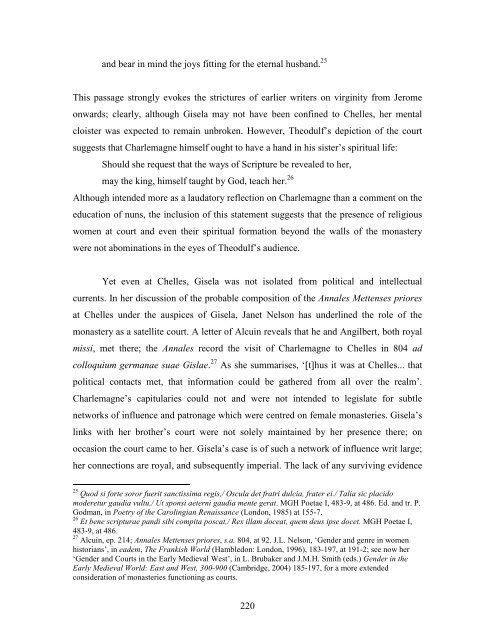Lindsay Rudge PhD Thesis - University of St Andrews
Lindsay Rudge PhD Thesis - University of St Andrews
Lindsay Rudge PhD Thesis - University of St Andrews
Create successful ePaper yourself
Turn your PDF publications into a flip-book with our unique Google optimized e-Paper software.
and bear in mind the joys fitting for the eternal husband. 25<br />
This passage strongly evokes the strictures <strong>of</strong> earlier writers on virginity from Jerome<br />
onwards; clearly, although Gisela may not have been confined to Chelles, her mental<br />
cloister was expected to remain unbroken. However, Theodulf’s depiction <strong>of</strong> the court<br />
suggests that Charlemagne himself ought to have a hand in his sister’s spiritual life:<br />
Should she request that the ways <strong>of</strong> Scripture be revealed to her,<br />
may the king, himself taught by God, teach her. 26<br />
Although intended more as a laudatory reflection on Charlemagne than a comment on the<br />
education <strong>of</strong> nuns, the inclusion <strong>of</strong> this statement suggests that the presence <strong>of</strong> religious<br />
women at court and even their spiritual formation beyond the walls <strong>of</strong> the monastery<br />
were not abominations in the eyes <strong>of</strong> Theodulf’s audience.<br />
Yet even at Chelles, Gisela was not isolated from political and intellectual<br />
currents. In her discussion <strong>of</strong> the probable composition <strong>of</strong> the Annales Mettenses priores<br />
at Chelles under the auspices <strong>of</strong> Gisela, Janet Nelson has underlined the role <strong>of</strong> the<br />
monastery as a satellite court. A letter <strong>of</strong> Alcuin reveals that he and Angilbert, both royal<br />
missi, met there; the Annales record the visit <strong>of</strong> Charlemagne to Chelles in 804 ad<br />
colloquium germanae suae Gislae. 27 As she summarises, ‘[t]hus it was at Chelles... that<br />
political contacts met, that information could be gathered from all over the realm’.<br />
Charlemagne’s capitularies could not and were not intended to legislate for subtle<br />
networks <strong>of</strong> influence and patronage which were centred on female monasteries. Gisela’s<br />
links with her brother’s court were not solely maintained by her presence there; on<br />
occasion the court came to her. Gisela’s case is <strong>of</strong> such a network <strong>of</strong> influence writ large;<br />
her connections are royal, and subsequently imperial. The lack <strong>of</strong> any surviving evidence<br />
25<br />
Quod si forte soror fuerit sanctissima regis,/ Oscula det fratri dulcia, frater ei./ Talia sic placido<br />
moderetur gaudia vultu,/ Ut sponsi aeterni gaudia mente gerat. MGH Poetae I, 483-9, at 486. Ed. and tr. P.<br />
Godman, in Poetry <strong>of</strong> the Carolingian Renaissance (London, 1985) at 155-7.<br />
26<br />
Et bene scripturae pandi sibi compita poscat,/ Rex illam doceat, quem deus ipse docet. MGH Poetae I,<br />
483-9, at 486.<br />
27<br />
Alcuin, ep. 214; Annales Mettenses priores, s.a. 804, at 92. J.L. Nelson, ‘Gender and genre in women<br />
historians’, in eadem, The Frankish World (Hambledon: London, 1996), 183-197, at 191-2; see now her<br />
‘Gender and Courts in the Early Medieval West’, in L. Brubaker and J.M.H. Smith (eds.) Gender in the<br />
Early Medieval World: East and West, 300-900 (Cambridge, 2004) 185-197, for a more extended<br />
consideration <strong>of</strong> monasteries functioning as courts.<br />
220

















